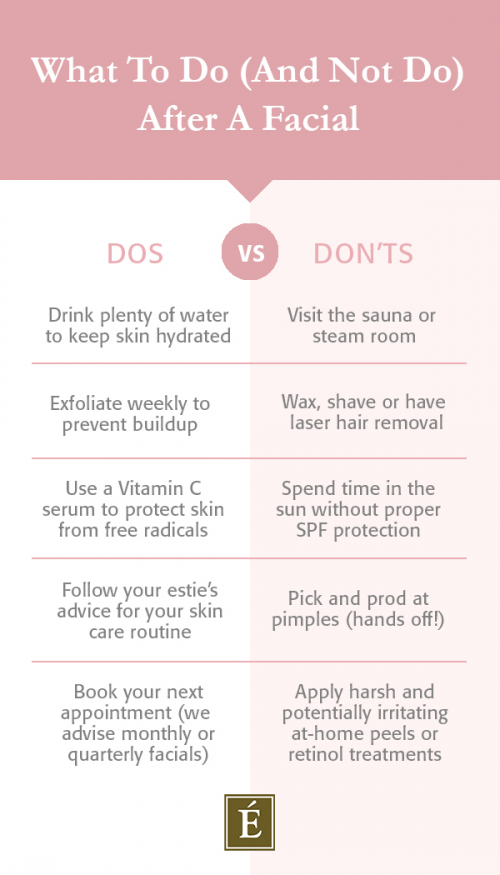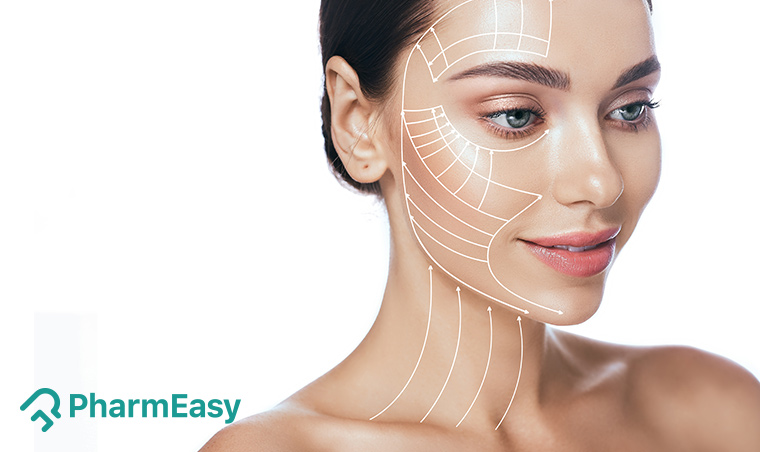Fort Walton Beach, FL
428 Mary Esther Cut Off NW Unit A,
Fort Walton Beach, FL
32548, United States
(850) 374-3595
Learn how to maintain the results of your facial at home! Discover effective tips and tricks to extend the benefits of your facial and keep your skin looking and feeling fabulous. From personalized skincare routines to sun protection and stress management, we've got you covered. Read now!

Maintaining the results of a facial at home can be a crucial step in achieving and preserving a radiant, healthy complexion. After all, it’s not just about the professional treatment you receive at the salon or spa; it’s also about what you do afterwards. So, how can you ensure that the effects of your luxurious facial last longer? In this article, we will explore some simple yet effective tips and tricks to help you extend the benefits of your facial and keep your skin looking and feeling fabulous. From personalized skincare routines to the right products and techniques, we’ve got you covered. So, let’s dive right in and discover how you can maintain the results of your facial at home!

This image is property of eminenceorganics.com.
Having a daily skincare routine is essential for maintaining the results of your facial at home. It helps keep your skin clean, healthy, and balanced. The following steps should be included in your routine:
Start your skincare routine by cleansing your face with a gentle cleanser. This will remove dirt, oil, and impurities from your skin, allowing it to breathe and absorb the products that follow. Make sure to choose a cleanser that is suitable for your skin type to avoid any irritation.
Exfoliating is an important step to remove dead skin cells and promote cell turnover. By doing this, you can achieve a brighter and smoother complexion. Choose a gentle exfoliator that won’t cause any irritation or damage to your skin. Exfoliating once or twice a week is usually sufficient for most skin types.
After cleansing and exfoliating, it’s important to tone your skin. Toning helps balance the pH levels of your skin and tightens the pores. It also preps your skin for better absorption of moisturizers and serums. Use an alcohol-free toner that suits your skin type and apply it with a cotton pad or by gently patting it onto your skin.
Moisturizing is a crucial step in any skincare routine, as it helps hydrate and nourish your skin. Choose a moisturizer that is appropriate for your skin type and concerns. Apply it evenly on your face and neck, using gentle upward strokes. Moisturizing not only provides hydration but also creates a protective barrier against external pollutants.
Protecting your skin from the harmful effects of the sun is vital for long-term skin health. Here are some tips to keep in mind:
Always apply sunscreen with at least SPF 30 before stepping outside. Sunscreen protects your skin from harmful UV rays, which can cause premature aging, sunburns, and even skin cancer. Choose a broad-spectrum sunscreen that offers protection against UVA and UVB rays. Don’t forget to reapply every two hours, especially if you’re spending time outdoors.
Try to limit your sun exposure during peak hours, which are generally between 10 am and 4 pm. If you need to be outside, seek shade and wear protective clothing, such as hats, sunglasses, and long sleeves. Remember that even on cloudy days, your skin can still be exposed to harmful UV rays, so it’s important to take precautions.
Hydration is key to maintaining healthy and glowing skin. Here’s how you can keep your skin hydrated:
Make it a habit to drink plenty of water throughout the day. Water keeps your skin hydrated from the inside out and helps flush out toxins. Aim for at least 8 glasses of water per day, but adjust the amount based on your activity level and climate.
Incorporating hydrating masks into your skincare routine can give your skin an extra boost of hydration. Look for masks that contain ingredients like hyaluronic acid, aloe vera, or honey, as these are known for their moisturizing properties. Apply the mask once or twice a week, leave it on for the recommended time, and then rinse off for instantly hydrated skin.
What you put into your body reflects on your skin. A healthy diet can contribute to radiant and clear skin. Consider the following tips:
Include plenty of fruits, vegetables, and whole grains in your diet. These foods are rich in vitamins, minerals, and antioxidants, which help nourish your skin from within. Some skin-friendly nutrients include vitamin C, vitamin E, beta-carotene, and omega-3 fatty acids. Incorporate foods like berries, spinach, avocados, and salmon into your meals for a healthy skin boost.
Processed foods often contain high amounts of unhealthy fats, sugar, and artificial ingredients that can negatively impact your skin’s health. These foods can contribute to inflammation, acne, and overall dullness. Instead, opt for whole foods and try to cook your meals at home using fresh ingredients whenever possible.

This image is property of www.thechilltimes.com.
Keeping your hands off your face is crucial for maintaining clean and healthy skin. Here’s why:
Wash your hands regularly with soap and water, especially before touching your face. Your hands come into contact with various surfaces throughout the day, collecting germs and bacteria. Touching your face with dirty hands can transfer these impurities onto your skin, leading to breakouts and infections.
Resist the temptation to pick at acne, pimples, or any skin imperfections. Picking at your skin can cause inflammation, scarring, and even introduce new bacteria into the affected area. If you have a pimple or blemish, it’s best to let it heal naturally or consult a dermatologist for proper treatment.
Sleep is not only essential for your overall well-being but also for the health of your skin. Consider the following tips to improve your sleep quality:
Create a bedtime routine that helps you wind down and relax before sleep. This may include activities such as reading a book, taking a warm bath, or practicing meditation. Establishing a routine signals to your body that it’s time to prepare for sleep, resulting in better sleep quality.
Switching to a silk pillowcase can have several benefits for your skin. Silk is gentle on your face, reducing friction that can lead to wrinkles and creases. It also helps maintain the moisture balance of your skin and hair, preventing dryness and frizz. Invest in a silk pillowcase to wake up with smoother and healthier-looking skin.

This image is property of blog-images-1.pharmeasy.in.
Stress can take a toll on your skin, leading to breakouts, dullness, and premature aging. Here’s how you can manage your stress levels:
Incorporate relaxation techniques into your daily routine, such as deep breathing, yoga, or meditation. These practices help calm your mind and reduce stress hormones, which can positively impact your skin’s health. Find what works best for you and make time for relaxation every day.
Engaging in activities you enjoy can serve as a form of stress relief. Whether it’s painting, gardening, or playing a musical instrument, find hobbies that bring you joy and help you unwind. These activities can distract your mind from stressors and promote a sense of well-being, ultimately benefiting your skin.
Regular exercise not only helps you maintain a healthy weight but also has several benefits for your skin. Consider the following tips:
Engage in physical activity for at least 30 minutes a day, most days of the week. Exercise increases blood flow, delivering essential nutrients and oxygen to your skin. It also helps flush out toxins through sweat, contributing to clearer and healthier-looking skin. Find activities you enjoy, whether it’s jogging, dancing, or practicing yoga, and make them a part of your routine.
If your lifestyle involves extended periods of sitting, make it a habit to take frequent breaks and move around. Prolonged sitting can restrict blood circulation, leading to dull and dehydrated skin. Set reminders to stand up, stretch, and walk around every hour to keep your skin and body revitalized.

This image is property of ik.manmatters.com.
In addition to maintaining a proper skincare routine at home, consider professional skincare treatments to enhance your results. Here are some options to explore:
Facials performed by trained estheticians can provide deep cleansing, exfoliation, and hydration for your skin. Regular facials can help address specific skin concerns and improve your overall complexion. Consult with a professional to determine the best facial treatments for your skin type and concerns.
Advanced skincare treatments, such as chemical peels, microdermabrasion, or laser therapies, can target specific skin issues more aggressively. These treatments are usually performed by dermatologists or licensed estheticians and can help with concerns like acne, scarring, fine lines, and hyperpigmentation. Always consult with a professional before proceeding with any advanced treatments to ensure they are suitable for your skin.
If you have specific skin concerns or are unsure about the best skincare practices for your skin type, don’t hesitate to seek professional advice. Dermatologists are medical experts specializing in skin health and can provide valuable insights and personalized recommendations. Here’s why you should consider consulting with a dermatologist:
A dermatologist can thoroughly assess your skin and provide recommendations tailored to your specific needs. They can identify any underlying conditions or concerns that may require additional treatment or medical intervention. Seeking professional advice ensures that you are taking the best possible care of your skin.
If you have persistent skin issues like acne, rosacea, eczema, or signs of premature aging, a dermatologist can offer targeted treatments and solutions. They have access to prescription medications, in-office procedures, and advanced therapies that can help address these concerns effectively. A dermatologist can guide you on the most suitable treatment options and create a personalized plan for long-term skin health.
Maintaining the results of your facial at home requires consistency and a holistic approach to skincare. By following a daily skincare routine, protecting your skin from the sun, staying hydrated, eating a healthy diet, minimizing face touching, getting enough sleep, managing stress levels, staying active, considering professional treatments, and seeking expert advice, you can achieve and maintain healthy and radiant skin. Remember, your skin is unique, so it’s important to listen to its needs and make adjustments as necessary.